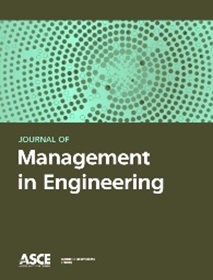Successful Change Management Strategies for Unforeseen Events: Impact of COVID-19 on Facility Management
IF 5.3
1区 工程技术
Q1 ENGINEERING, CIVIL
引用次数: 2
Abstract
Facility managers are increasingly tasked with being the champions of change in their organizations, which may include activities such as space management revisions, construction delivery practices, maintenance programs, technology implementations, and others. While much of the previous organization change management research has focused on how facility managers enable the adoption of planned change events (i.e., new technology), this study identifies the successful change strategies used in responding to unforeseen circumstances or events. The researchers evaluated these unplanned changes through the lens of COVID-19, given its nearly universal impact on facility management as a profession. The research team collected survey data from nearly 900 organizations in more than 60 countries, and conducted detailed follow-up interviews with 28 organizations. Twenty-two parameters were grouped into three categories: organizational characteristics, organizational change management practices, and change adoption measures. The research team used three random forest models and three logistic regression models to further examine the relationship between the data and the change adoption measures. The results indicate that three organizational change practices were particularly important to overall adoption success and achievement: appointment of a change agent, support of leaders, and the timeframe for implementing the change. The analysis also suggests that the type of unplanned change initiative has an impact on its long-term adoption throughout the organization. Organizations should consider using a formal change management approach in order to successfully implement unplanned change initiatives. This paper highlights the importance of an effective change, the active involvement and support of senior leaders, and the timeline of implementing the change - even if it is unforeseen. © 2023 American Society of Civil Engineers.意外事件的成功变革管理策略:新冠肺炎对设施管理的影响
设施管理人员的任务越来越多,成为组织变革的倡导者,这可能包括空间管理修订、施工交付实践、维护计划、技术实施等活动。以前的许多组织变革管理研究都集中在设施管理人员如何能够采用计划的变革事件(即新技术),而本研究确定了在响应不可预见的情况或事件时使用的成功变革策略。研究人员通过COVID-19的视角评估了这些计划外的变化,因为它对设施管理作为一种职业产生了几乎普遍的影响。研究小组收集了来自60多个国家近900个组织的调查数据,并对28个组织进行了详细的后续访谈。22个参数被分成三大类:组织特征、组织变更管理实践和变更采用措施。研究小组采用三种随机森林模型和三种逻辑回归模型进一步检验了数据与变革采纳措施之间的关系。结果表明,三个组织变革实践对于整体的成功采用和成就是特别重要的:任命一个变革代理人,领导的支持,以及实施变革的时间框架。分析还表明,计划外变更主动性的类型对其在整个组织中的长期采用有影响。组织应该考虑使用正式的变更管理方法,以便成功地实施计划外的变更计划。本文强调了有效变革的重要性,高层领导的积极参与和支持,以及实施变革的时间表-即使它是不可预见的。©2023美国土木工程师学会。
本文章由计算机程序翻译,如有差异,请以英文原文为准。
求助全文
约1分钟内获得全文
求助全文
来源期刊

Journal of Management in Engineering
工程技术-工程:工业
CiteScore
12.60
自引率
23.00%
发文量
124
审稿时长
2.3 months
期刊介绍:
The Journal of Management in Engineering offers an avenue for researchers and practitioners to present contemporary issues associated with management and leadership for the civil engineer. The journal publishes peer-reviewed papers, case studies, technical notes, and discussions of interest to the practice of civil engineering.
 求助内容:
求助内容: 应助结果提醒方式:
应助结果提醒方式:


